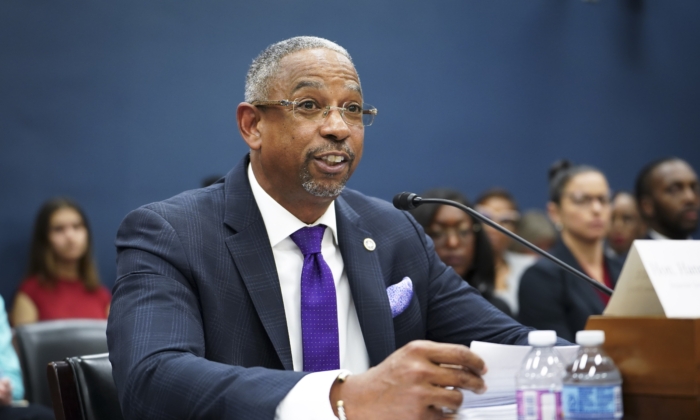Ware said that the Inspector General Act of 1978 requires the president to notify Congress at least 30 days in advance of dismissal of an inspector general.
President Donald Trump has reportedly dismissed at least a dozen inspectors general—presidentially-appointed watchdogs who oversee government agencies—prompting allegations that the move is illegal, setting up a possible showdown in court over the purported firings.
Hannibal Ware, the inspector general for the Small Business Administration (SBA) and chairperson of the Council of the Inspectors General on Integrity and Efficiency (CIGIE), said in a Jan. 24 letter sent to Sergio Gor, director of presidential personnel at the White House, objecting to a series of dismissal emails Gor had sent to a number of inspector generals—including to Ware.
“I am writing in response to your email sent to me and other Inspectors General earlier this evening wherein you informed each of us that ‘due to changing priorities, your position as Inspector General … is terminated, effective immediately,’” Ware wrote in the letter to Gor.
“At this point, we do not believe the actions taken are legally sufficient to dismiss Presidentially Appointed, Senate Confirmed Inspectors General,” Ware wrote.
Ware said that the Inspector General Act of 1978 requires the president to notify Congress at least 30 days in advance of dismissal of an inspector general and that “substantive rationale, including detailed and case-specific reasons” for such terminations must be provided.
Ware was confirmed to his role by the Senate in 2018. In 2024, President Joe Biden appointed Ware to also lead the Office of the Inspector General for the Social Security Administration. Ware’s eligibility to serve in the latter acting role, sans Senate confirmation, expired on Jan. 24.
It’s unclear which inspectors general were told by the White House they are being fired.
The White House has not confirmed the terminations and did not respond to a request for comment from The Epoch Times. An inquiry sent to Ware asking what further action the CIGIE is planning to take was also not returned.
Congress established the offices of inspectors general as part of its Watergate-era reforms following the administration of President Richard Nixon. The role of inspectors general is to independently audit, inspect, and investigate government agencies to ensure accountability.
There are currently 57 inspectors general, 29 of which are appointed by the president and confirmed by the Senate and another 28 who are appointed by their agency heads, according to the Government Accountability Office.
Reports of the dismissals sparked a number of critical reactions on the part of Democratic lawmakers.
“Yesterday, in the dark of night, President Trump fired at least 12 independent Inspectors General at important federal agencies across the administration,” Sen. Chuck Schumer (D-N.Y.) said on the Senate floor on Jan. 25.
Schumer called it a “chilling purge” and added that the dismissals appear to be in violation of federal law.
In a post on X, Sen. Elizabeth Warren (D-Mass.) called the dismissals a “purge of independent watchdogs in the middle of the night” and accused Trump of “dismantling checks on his power and paving the way for widespread corruption.”
Responding to Warren’s criticism, Trump supporter and attorney. Sidney Powell, defended the terminations.
“Existing IGs are virtually worthless,” Powell wrote in a post on X. “They may bring a few minor things to light but accomplish next to nothing. The whole system needs to be revamped!! They are toothless and protect the institution instead of the citizens.”
Inspectors general often serve across multiple administrations, but during his first term, Trump fired five over the course of several months in 2020. In context of one of the dismissals, Trump said that it was within his executive authority to do so and that he believed inspectors general were in most cases “very political.”
In 2022, Congress enhanced protections for inspectors general, limiting presidential authority to replace them and requiring detailed justifications for their removal.

